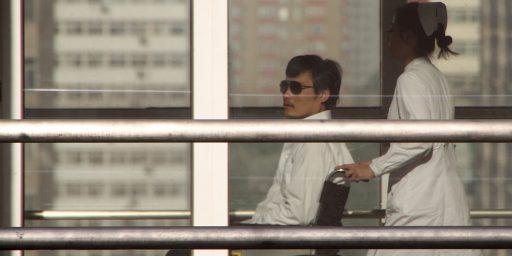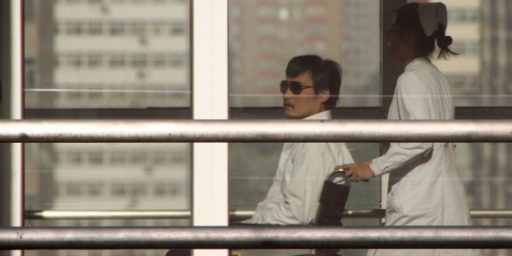Chinese Dissident Leaves U.S. Embassy, Will Stay In China
What appeared to be something that would develop into a diplomatic standoff between Washington and Beijing came to an abrupt, and someone surprising, end today:
BEIJING — Chen Guangcheng, the blind Chinese dissident who fled house arrest last month in a dramatic escape from security forces, left the American Embassy in Beijing on Wednesday after securing assurances from the Chinese government that he would remain safe, American officials said in the first account of his diplomatically tense six-day stay there.
The officials described details of the negotiations between both governments and Mr. Chen as well as a telephone call to the dissident from Secretary of State Hillary Rodham Clinton after he left the embassy compound for treatment at a medical facility here.
Mrs. Clinton said in a statement that she was “pleased that we were able to facilitate Chen Guangcheng’s stay and departure from the U.S. Embassy in a way that reflected his choices and our values. I was glad to have the chance to speak with him today and to congratulate him on being reunited with his wife and children.”
“Mr. Chen has a number of understandings with the Chinese government about his future, including the opportunity to pursue higher education in a safe environment,” she added. “Making these commitments a reality is the next crucial task.”
Mr. Chen entered the American Embassy six days ago with the assistance of American officials because of the “exceptional circumstances, including his disabilities,” a senior American official told American reporters traveling with Mrs. Clinton. “On humanitarian grounds we assisted him and allowed him to remain on a temporary basis,” the official said.
Mr. Chen, a lawyer who had campaigned against forced abortions and sterilizations conducted as part of China’s policy of limiting families to one child, suffered an injury to his foot during his escape from his house in Shandong province last week and was walking with the help of a crutch, the official said.
During his time at the embassy, Mr. Chen adhered to his position that he was not seeking asylum in the United States but wanted to stay with his family in China as a free person, said the official, who was involved in the three-way negotiations that involved Mr. Chen and officials from the United States and China.
“He expressed his hope to stay in China and he never varied from that,” a second senior official involved in the negotiations, who briefed reporters, said.
On Wednesday afternoon, after Mrs. Clinton’s arrival about six hours earlier, and after the Chinese had made commitments to guarantee his safety, the Ambassador Gary Locke asked Mr. Chen if he was ready to leave the American Embassy.
Mr. Chen, who speaks broken English, said in Chinese: “‘Let’s go,'” one of the two American officials said.
(…)
Under the arrangement agreed to by the United States, China and Mr. Chen, he would be relocated to a different part of China from his hometown in Shandong Province, where he was under house arrest and where he says his family had been physically attacked, the officials said.
Mr. Chen would be allowed to enroll at a university to pursue his law studies, a profession in which he is self-taught, the senior official said. “He will have several university options,” one of the officials said.
The American officials said they were satisfied with the pledges from the Chinese authorities that Mr. Chen, 40, would be allowed to live a normal life. The Chinese promised to report any actions against him, they said.
Precisely what the Chinese government offered as a way of protection for Mr. Chen was not immediately clear. The American officials went out of their way to praise the Chinese negotiators. They described them as working “intensely and with humanity.”
There appeared to be no similar case in which a high-profile Chinese dissident had sought protection at the American Embassy and then returned to Chinese custody. American human rights officials and lawyers have often questioned whether the Chinese would provide the protection they promised in such a situation.
“This was not easy for the Chinese government,” one of the senior American officials said.
Does this signal a shift in China on human rights issues? A recognition that the harsh light of world publicity means that they can no longer silence dissent like they used to? That’s unclear but Chen is undoubtedly a far more powerful voice for change if he stays inside country. Which means the deal in itself all the more interesting.






We should start a pool on how long China waits before deciding America isn’t paying attention anymore an rearrests Guangcheng.
@Stormy Dragon: Exactly. The Chinese government never forgets. This man could be dead in a year. And what about those that helped him escape?
China is also demanding an apology for us allowing him to enter our Embassy. Kind of like the Hainan incident back in 2001. This time, however, they don’t have a US aircrew to hold hostage.
A year or less from now, who will remember this mensch? China needs to do nothing, (unless the Maoist wing wins the leadership) to him.
It’s now being revealed that Guangcheng only left the embassy because the Chinese government was going to murder his wife if he didn’t:
http://www.cbsnews.com/8301-202_162-57426088/activist-chen-guangcheng-wants-to-leave-china-amid-fears-for-familys-safety-after-leaving-embassy/
I hope that the US monitors this situation and makes sure that this man and his family are not harmed. While we are at it, monitor the Chinese treatment of its citizens. If there are violations, severe sanctions would be imposed.
And here’s an Aljazeera round up of tweets, blog entries, etc. Seems the plan wasn’t so cunning after all.